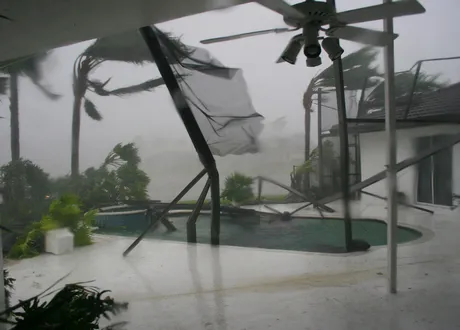Corn suppliers have confirmed that the majority of the corn crop in Bainbridge, Georgia was destroyed by Hurricane Michael earlier this month. Additionally, some farming infrastructure was damaged although much of this has come through unscathed, including packing houses, most of which have survived. In terms of physical infrastructure, reports are that some areas were worse hit than others, although overall the majority of buildings in the growing district survived.
"We lost about three quarters of our corn crops," said Matthew Powell of Mt Pleasant Sales. "We were able to harvest whatever we could before the storm, but in the end a lot of the corn got blown over and the majority was lost. We also received some damage to our irrigation systems but fortunately the packing house made it through ok. As you drive around the area, you notice that in some places the trees have all been blown over, while in others, they are more intact."
Growers are now concentrating on cleaning up and while the market has risen on corn, there isn't any tangible amount left for Georgia growers to be able to recover anything. "We should be finishing up in the next few days with picking whatever corn is remaining in the fields," Powell added. "The market is higher but there is simply not enough corn around for growers in the area to recoup losses. The growers that we deal with all carry insurance so that is the path that will have to be taken. We are confident of coming back strongly when the planting season returns in spring."

Tomato and vegetable growers "already suffering" before storm
Closer to the coast in Florida, vegetable and especially tomato growers have also seen the majority of their crops lost to the hurricane. Markets have not reacted as strongly as might be expected though and supplies to the North American market overall remain fairly steady. "We haven't noticed too much of a change in supply to be honest," said one Florida tomato broker. "Prices have bumped up slightly but not by much."
Trampis Dowdle, a Florida grower who has spent his life growing vegetables and watermelons, said the crops were damaged. According to him, however, the hurricane was just one chapter in a tale of woe for Florida vegetable growers who have been losing money for some time. "Yes, there were crop losses from Hurricane Michael but that is not the biggest problem facing Florida growers or in fact American growers more broadly," he said. "We have been suffering for years because produce has been coming from offshore at a much lower cost, undercutting US growers and putting a significant number out of business."
According to Dowdle, the government needs to address this before more farmers lose their livelihoods. He noted that Florida growers are particularly affected. "Any money received from the government to help with hurricane damage is welcomed, but is not a fix for the much bigger issue of low-priced fruit and vegetables coming in from overseas," he said. "Florida suffers the most because our vegetable and tomato seasons overlap with those in Mexico. As a result, although retailers are looking to stock locally-grown produce, they are leveraging the prices they can get from offshore produce and paying the US farmers significantly less than what they need to cover costs. There is no way we can compete on costs. One farmer I know who also grows in Mexico says that what he pays for a worker in the US for day is the equivalent to what he pays a worker in Mexico for a month. How can we compete with that?" He also claimed that some of the freighted produce coming over the border is a front for more sinister activities. "I have personally witnessed and seen a truck with a couple of pallets of produce used as a cover for drug importation," he said. "They then sell off the produce for whatever they can get for it, typically very little, exacerbating the oversupply issue."
In conclusion, Dowdle emphasized that growers in the US are not against having imports as part of the normal cycle of the produce season, just that there needs to be more of a balance between supply and demand. "It's not that we are against bringing in offshore produce, it's just that it needs to be regulated to make sure it only is able to enter when there is a shortage so that US farmers can cover their costs and earn a liveable income. As it stands now, the next generation are looking to other forms of work because farming is not sustainable for us anymore, hurricane or no hurricane."
Damage still being assessed
The University of Florida are currently undergoing analysis of the damage and hope to place a dollar value on it in the next few weeks. Dr. Alan Hodges, who is one of the researchers gathering data, said they are still working on estimates but don't have any preliminary numbers yet. He did note that one the teams was flying drones to assess crop damage and found there were very heavy losses of tomatoes and peppers.
The cleanup from Hurricane Michael continues in Georgia and Florida and there are many months to go before growers there can return to normal duties. In the meantime, growers like Dowdle will be pondering whether or not it's worthwhile to continue.
For more information:
Matthew Powell
Mt Pleasant Sales
Tel: +1 (229) 246-1838
[email protected]
www.mtpleasantsales.com
Trampis Dowdle
Dowdle Farms
Tel: +1 (863) 781-0440
[email protected]
